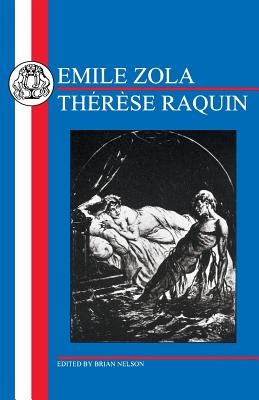
- We will send in 10–14 business days.
- Author: Ėmile Zola
- Publisher: Bristol Classical Press
- ISBN-10: 1853992879
- ISBN-13: 9781853992872
- Format: 13.9 x 21.7 x 1.1 cm, minkšti viršeliai
- Language: English
- SAVE -10% with code: EXTRA
Reviews
Description
A gothic tale of murder and adultery, Thérèse Raquin was denounced as
pornography on its publication in 1867. Putrid literature was how
Louis Ulbach described the novel in a contemporary review. Zola
defended himself against these attacks in his preface to the second
edition, in which he outlined his aim to produce a new, scientific
form of realism. The novel marks a crucial step in Zola's development
and is a major early work of Naturalism.
Thérèse Raquin, Brian Nelson places the novel in its cultural,
intellectual and artistic contexts, and compares Zola's scientific aims
with his actual practice in this work. The scientific status of
Naturalist fiction remains problematic; in the final analysis it is
influenced by literary models and conventions. Zola's powerful
mythopoeic imagination does much to counteract the mechanistic view of
humanity the novel was intended to embody. The myth of the fall is,
indeed, fundamental to Zola's Naturalistic vision.
EXTRA 10 % discount with code: EXTRA
The promotion ends in 23d.10:03:44
The discount code is valid when purchasing from 10 €. Discounts do not stack.
- Author: Ėmile Zola
- Publisher: Bristol Classical Press
- ISBN-10: 1853992879
- ISBN-13: 9781853992872
- Format: 13.9 x 21.7 x 1.1 cm, minkšti viršeliai
- Language: English English
A gothic tale of murder and adultery, Thérèse Raquin was denounced as
pornography on its publication in 1867. Putrid literature was how
Louis Ulbach described the novel in a contemporary review. Zola
defended himself against these attacks in his preface to the second
edition, in which he outlined his aim to produce a new, scientific
form of realism. The novel marks a crucial step in Zola's development
and is a major early work of Naturalism.
Thérèse Raquin, Brian Nelson places the novel in its cultural,
intellectual and artistic contexts, and compares Zola's scientific aims
with his actual practice in this work. The scientific status of
Naturalist fiction remains problematic; in the final analysis it is
influenced by literary models and conventions. Zola's powerful
mythopoeic imagination does much to counteract the mechanistic view of
humanity the novel was intended to embody. The myth of the fall is,
indeed, fundamental to Zola's Naturalistic vision.


Reviews